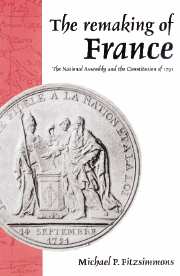Book contents
- Frontmatter
- Contents
- Preface
- List of abbreviations
- Part one
- 1 The crisis of the Old Regime
- 2 The formation of the new ideal of the polity
- 3 The achievement of the new ideal of the polity
- 4 The new ideal of the polity reaffirmed
- Part two
- Conclusion
- Appendix
- Bibliographical note and list of manuscript sources
- Index
1 - The crisis of the Old Regime
Published online by Cambridge University Press: 14 October 2009
- Frontmatter
- Contents
- Preface
- List of abbreviations
- Part one
- 1 The crisis of the Old Regime
- 2 The formation of the new ideal of the polity
- 3 The achievement of the new ideal of the polity
- 4 The new ideal of the polity reaffirmed
- Part two
- Conclusion
- Appendix
- Bibliographical note and list of manuscript sources
- Index
Summary
A kingdom in which the provinces are unknown to one another … where privileges upset all equilibrium, where it is not possible to have either steadfast rule or consensus, is obviously a very imperfect kingdom
Calonne to Louis XVI, August 20, 1786In presenting a memorandum to the monarch that candidly delineated several deficiencies in the structure and administration of the kingdom, the Controller-General of Finances, Charles-Alexandre de Calonne, sought to make Louis XVI comprehend that modifications in the traditional method of governance were imperative. Under the Old Regime, French society was organized corporatively. In order to bypass the Estates-General, the traditional institution for popular consent, the Crown, in exchange for recognition of the imposition of its authority, had bolstered the corporate framework of French society. As a result, a demarcation remained between the state and society – the Crown was less an integral part of society than a separately constituted entity. The metaphors and vocabulary of theorists sought to emphasize a holistic image of the polity and to portray it as an organic whole, but the reality was quite different.
Inextricably connected with this corporate structure – indeed, its very underpinning – was privilege. Privilege was the primary instrument of government and therefore the chief medium of political exchange between the state and society. At the beginning of each reign, for example, one method used by the new monarch to announce his accession to the throne was to issue an edict that confirmed the privileges of different provinces.
- Type
- Chapter
- Information
- The Remaking of FranceThe National Assembly and the Constitution of 1791, pp. 3 - 32Publisher: Cambridge University PressPrint publication year: 1994

